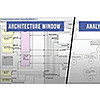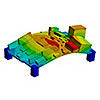According to Günter Gäbelein, Safety Assessor at ZF Friedrichshafen AG, “As a systems supplier for passenger cars, commercial vehicles, and industrial technology, ZF Friedrichshafen AG places great emphasis on agility and innovation. To support exciting developments like autonomous driving and electric mobility, our R&D process must be fast, cost effective, and technically precise. More and more projects are taking advantage of synergies provided by medini analyze. In a medium-size project, more than 300 hours of effort can be saved by the one-tool solution and the interfaces to third-party tools for architectures. ZF is a strong advocate for model-based engineering, and medini analyze helps to reduce the complexity of analysis for embedded systems."






